Than做连词的用法
- 格式:ppt
- 大小:417.50 KB
- 文档页数:14
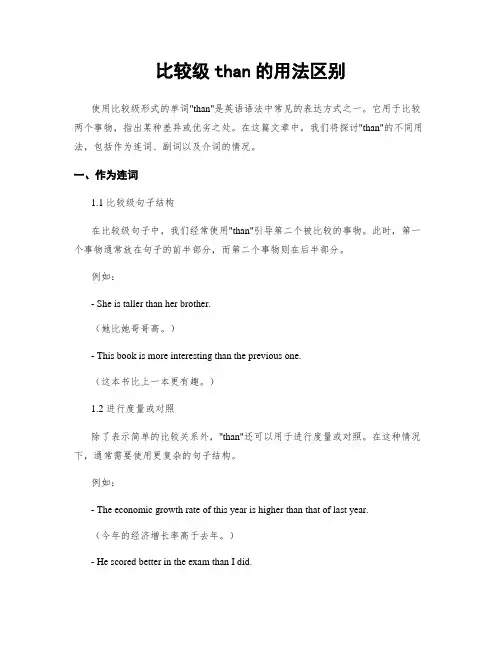
比较级than的用法区别使用比较级形式的单词"than"是英语语法中常见的表达方式之一。
它用于比较两个事物,指出某种差异或优劣之处。
在这篇文章中,我们将探讨"than"的不同用法,包括作为连词、副词以及介词的情况。
一、作为连词1.1 比较级句子结构在比较级句子中,我们经常使用"than"引导第二个被比较的事物。
此时,第一个事物通常放在句子的前半部分,而第二个事物则在后半部分。
例如:- She is taller than her brother.(她比她哥哥高。
)- This book is more interesting than the previous one.(这本书比上一本更有趣。
)1.2 进行度量或对照除了表示简单的比较关系外,"than"还可以用于进行度量或对照。
在这种情况下,通常需要使用更复杂的句子结构。
例如:- The economic growth rate of this year is higher than that of last year.(今年的经济增长率高于去年。
)- He scored better in the exam than I did.(他在考试中得分比我高。
)二、作为副词除了做连词外,"than"还可以充当副词来修饰形容词或副词,并进一步加强比较的程度。
在这种情况下,"than"通常放置在被修饰词之前。
例如:- The weather today is colder than yesterday.(今天的天气比昨天更冷。
)- She spoke more confidently than her partner.(她说话比她的伙伴更有信心。
)三、作为介词此外,"than"还可以作为介词出现在句子中,引导介词短语。
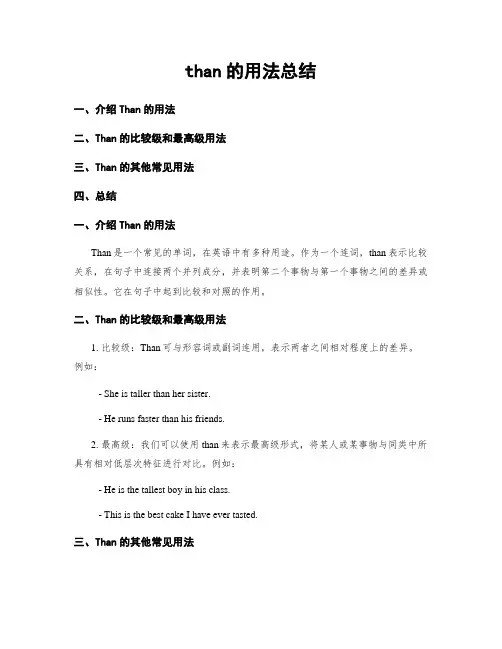
than的用法总结一、介绍Than的用法二、Than的比较级和最高级用法三、Than的其他常见用法四、总结一、介绍Than的用法Than是一个常见的单词,在英语中有多种用途。
作为一个连词,than表示比较关系,在句子中连接两个并列成分,并表明第二个事物与第一个事物之间的差异或相似性。
它在句子中起到比较和对照的作用。
二、Than的比较级和最高级用法1. 比较级:Than可与形容词或副词连用,表示两者之间相对程度上的差异。
例如:- She is taller than her sister.- He runs faster than his friends.2. 最高级:我们可以使用than来表示最高级形式,将某人或某事物与同类中所具有相对低层次特征进行对比。
例如:- He is the tallest boy in his class.- This is the best cake I have ever tasted.三、Than的其他常见用法1. Than引导从句:当一个从句与than连接时,意味着该从句提供了比较中所需的信息。
例如:- She works harder than anyone else in the office.2. Than引导非限制性定语从句:当我们想要进一步描述某人或某物,并与其他人或物进行比较时,可以使用than引导非限制性定语从句。
例如: - My sister, who is taller than me, loves playing basketball.3. Than也可以用作介词,表示“除了”、“比”等含义,常与不定式连用。
例如:- I have no choice other than to accept the offer.- She has more things to worry about than her grades.4. 在固定短语中:Than也出现在一些固定的短语中,如"rather than"、"other than"等。
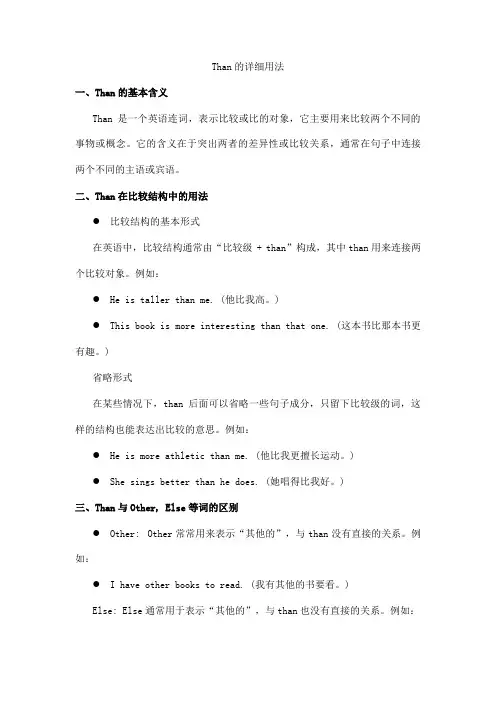
Than的详细用法一、Than的基本含义Than是一个英语连词,表示比较或比的对象,它主要用来比较两个不同的事物或概念。
它的含义在于突出两者的差异性或比较关系,通常在句子中连接两个不同的主语或宾语。
二、Than在比较结构中的用法●比较结构的基本形式在英语中,比较结构通常由“比较级 + than”构成,其中than用来连接两个比较对象。
例如:●He is taller than me. (他比我高。
)●This book is more interesting than that one. (这本书比那本书更有趣。
)省略形式在某些情况下,than后面可以省略一些句子成分,只留下比较级的词,这样的结构也能表达出比较的意思。
例如:●He is more athletic than me. (他比我更擅长运动。
)●She sings better than he does. (她唱得比我好。
)三、Than与Other, Else等词的区别●Other: Other常常用来表示“其他的”,与than没有直接的关系。
例如:●I have other books to read. (我有其他的书要看。
)Else: Else通常用于表示“其他的”,与than也没有直接的关系。
例如:●What else do you want to know? (你还想知道什么其他的?)四、Than在固定搭配中的使用●比较级 + than + 不定代词:这种结构表示某个事物的某个方面超过其他事物。
例如:●She has more money than anyone else. (她比其他任何人都有钱。
)比较级 + than + 副词:这种结构用于表示比较关系,通常放在动词后面。
例如:●She studies harder than ever before. (她比以前更加努力地学习。
)倍数 + 比较级 + than:这种结构用于表示某事物是另一事物的几倍大小或程度。
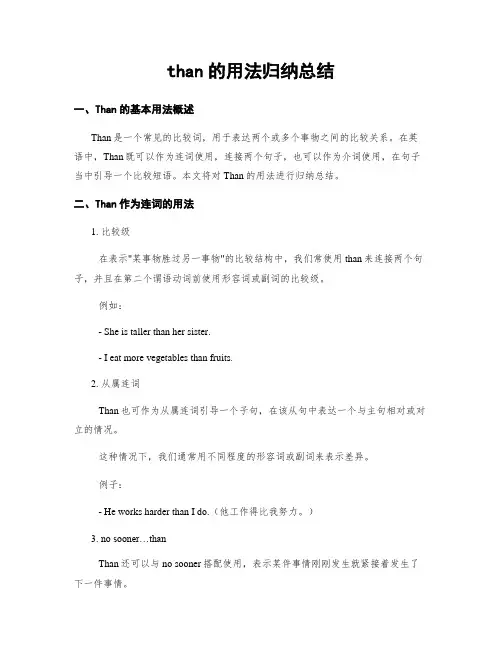
than的用法归纳总结一、Than的基本用法概述Than是一个常见的比较词,用于表达两个或多个事物之间的比较关系。
在英语中,Than既可以作为连词使用,连接两个句子,也可以作为介词使用,在句子当中引导一个比较短语。
本文将对Than的用法进行归纳总结。
二、Than作为连词的用法1. 比较级在表示"某事物胜过另一事物"的比较结构中,我们常使用than来连接两个句子,并且在第二个谓语动词前使用形容词或副词的比较级。
例如:- She is taller than her sister.- I eat more vegetables than fruits.2. 从属连词Than也可作为从属连词引导一个子句,在该从句中表达一个与主句相对或对立的情况。
这种情况下,我们通常用不同程度的形容词或副词来表示差异。
例子:- He works harder than I do.(他工作得比我努力。
)3. no sooner…thanThan还可以与no sooner搭配使用,表示某件事情刚刚发生就紧接着发生了下一件事情。
例如:- No sooner had she finished her speech than she left the stage.4. rather…than当我们要表达两个选择时,我们常常使用rather...than结构来表示对第一个选择的偏好。
例子:- I would rather stay at home and watch a movie than go out in the rain.三、Than作为介词的用法1. 比较短语Than也可以作为介词使用,引导一个比较短语,用于比较两个事物之间的差异或进行评估。
例如:- She is older than me.- This book is more expensive than that one.2. Rather thanThan还可以和rather连用,表示对某种情况或选择的偏好。

than的用法小结一、than的基本意思和用法Than是一个常见的英语单词,主要用作介词、连词或副词。
它和比较级形容词或副词一起使用,表达“比……更”这样的比较关系。
接下来将从不同的角度总结than的用法。
1. 作为介词当than被用作介词时,其后通常跟随一个名词短语或动名词短语,并表示一种比较关系。
例如:- She is taller than her sister.(她比她姐姐高。
)- He earns more money than his colleagues.(他赚的钱比他的同事多。
)2. 作为连词当than被用作连词时,它连接两个分句,引出一个比较级形式。
例如:- She is smarter than I am.(她比我聪明。
)- He works harder than his coworkers.(他工作比同事们更努力。
)3. 表示时间顺序有时候,than可以表示时间上的先后顺序,相当于“然后”。
例如:- First, cook the pasta, than add the sauce.(首先,煮面条,然后加酱汁。
)二、其他常见表达方式除了基本意义以外,than在某些情况下还有额外用法。
1. no sooner...than...这个短语结构用于表示“刚……就……”。
例如:- No sooner had I sat down than the phone rang.(我刚一坐下,电话就响了。
)2. other than这个短语意思是“除了……之外”,常常用来介绍一个例外情况。
例如:- She doesn't have any hobbies other than reading.(除了阅读,她没有其他的爱好。
)3. rather than这个短语相当于instead of,意为“而不是”。
例如:- I would prefer tea rather than coffee.(我更喜欢茶而不是咖啡。
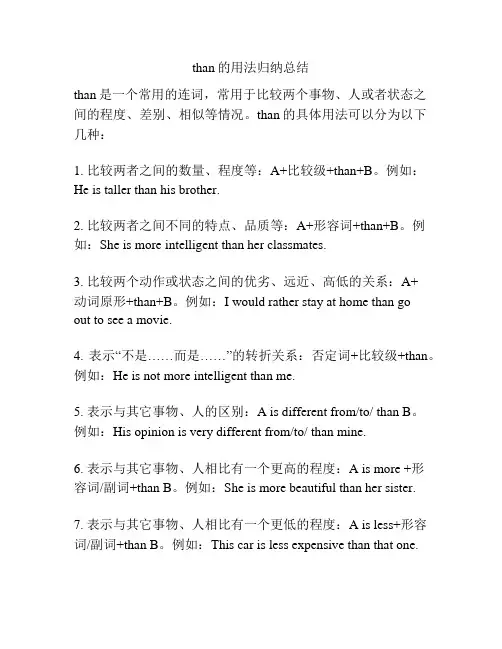
than的用法归纳总结than是一个常用的连词,常用于比较两个事物、人或者状态之间的程度、差别、相似等情况。
than的具体用法可以分为以下几种:1. 比较两者之间的数量、程度等:A+比较级+than+B。
例如:He is taller than his brother.2. 比较两者之间不同的特点、品质等:A+形容词+than+B。
例如:She is more intelligent than her classmates.3. 比较两个动作或状态之间的优劣、远近、高低的关系:A+动词原形+than+B。
例如:I would rather stay at home than goout to see a movie.4. 表示“不是……而是……”的转折关系:否定词+比较级+than。
例如:He is not more intelligent than me.5. 表示与其它事物、人的区别:A is different from/to/ than B。
例如:His opinion is very different from/to/ than mine.6. 表示与其它事物、人相比有一个更高的程度:A is more +形容词/副词+than B。
例如:She is more beautiful than her sister.7. 表示与其它事物、人相比有一个更低的程度:A is less+形容词/副词+than B。
例如:This car is less expensive than that one.需要注意的是,than不仅用于比较级中,还可以和as连用表示“和……一样”,例如:She is as tall as her father。
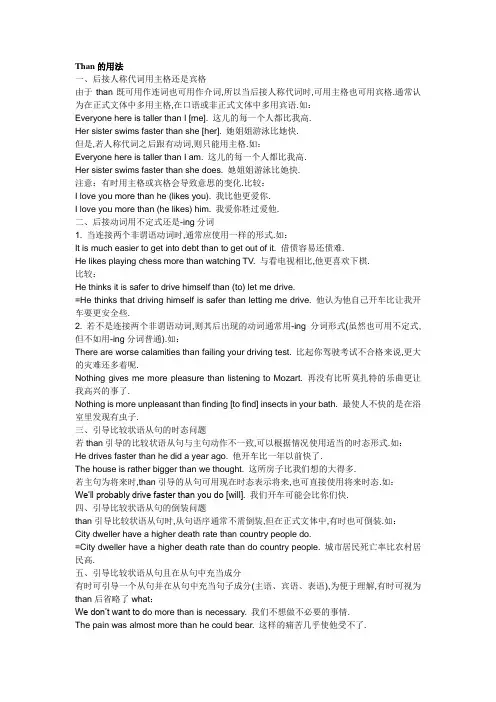
Than的用法一、后接人称代词用主格还是宾格由于than既可用作连词也可用作介词,所以当后接人称代词时,可用主格也可用宾格.通常认为在正式文体中多用主格,在口语或非正式文体中多用宾语.如:Everyone here is taller than I [me]. 这儿的每一个人都比我高.Her sister swims faster than she [her]. 她姐姐游泳比她快.但是,若人称代词之后跟有动词,则只能用主格.如:Everyone here is taller than I am. 这儿的每一个人都比我高.Her sister swims faster than she does. 她姐姐游泳比她快.注意:有时用主格或宾格会导致意思的变化.比较:I love you more than he (likes you). 我比他更爱你.I love you more than (he likes) him. 我爱你胜过爱他.二、后接动词用不定式还是-ing分词1. 当连接两个非谓语动词时,通常应使用一样的形式.如:It is much easier to get into debt than to get out of it. 借债容易还债难.He likes playing chess more than watching TV. 与看电视相比,他更喜欢下棋.比较:He thinks it is safer to drive himself than (to) let me drive.=He thinks that driving himself is safer than letting me drive. 他认为他自己开车比让我开车要更安全些.2. 若不是连接两个非谓语动词,则其后出现的动词通常用-ing分词形式(虽然也可用不定式,但不如用-ing分词普通).如:There are worse calamities than failing your driving test. 比起你驾驶考试不合格来说,更大的灾难还多着呢.Nothing gives me more pleasure than listening to Mozart. 再没有比听莫扎特的乐曲更让我高兴的事了.Nothing is more unpleasant than finding [to find] insects in your bath. 最使人不快的是在浴室里发现有虫子.三、引导比较状语从句的时态问题若than引导的比较状语从句与主句动作不一致,可以根据情况使用适当的时态形式.如:He drives faster than he did a year ago. 他开车比一年以前快了.The house is rather bigger than we thought. 这所房子比我们想的大得多.若主句为将来时,than引导的从句可用现在时态表示将来,也可直接使用将来时态.如:We’ll probably drive faster than you do [will]. 我们开车可能会比你们快.四、引导比较状语从句的倒装问题than引导比较状语从句时,从句语序通常不需倒装,但在正式文体中,有时也可倒装.如:City dweller have a higher death rate than country people do.=City dweller have a higher death rate than do country people. 城市居民死亡率比农村居民高.五、引导比较状语从句且在从句中充当成分有时可引导一个从句并在从句中充当句子成分(主语、宾语、表语),为便于理解,有时可视为than后省略了what:We don’t want to d o more than is necessary. 我们不想做不必要的事情.The pain was almost more than he could bear. 这样的痛苦几乎使他受不了.She’s not a very good manager she always spends more money than she earns. 她不大会理财——总是入不敷出.Life here is much easier than it used to be. 如今在此地生活比起从前可舒服多了.比较下面一句,than后的expected为省略结构:He returned three days earlier than (he was) expected. 他回来得比预料的要早三天.六、后接时间或条件状语从句若语义需要,有时其后可接when引导的时间状语从句以及if 引导的条件状语从句.如:You are a little fatter than when I saw you last. 你比我上次见你时胖点了.Joe carries only nine pounds more than when he was twenty. 乔比他20岁时只重了九磅. They work better together than if they are alone. 他们一起干比他们单干效果要好.七、同质比较还是异质比较than 通常用于两个不同的人或物在同一方面进行比较,但有时指的可能是同一个人或物在两个不同的方面进行比较,此时只用于more…than…结构,而不能用–er…than…的形式(即使是单音节也是如此),这类结构通常可译为“与其……不如……”“有……无……”.如:He’s more fat than short. 与其说他矮不如说他胖.They are more brave than wise. 他们有勇无谋.If we tell him about it, it may do more harm than good. 倘若我们把情况告诉他,那可能弊多利少.八、与never (a) 连用时如何理解有时than与带有never (a) 的比较级结构连用,表示强调,通常表示最高级的含义.如:I’ve never had a worse morning than today. 我哪一天早上也不像今天早上这样倒霉.若意思明确,有时可省略than结构.如:He is fine, never better. 他很好,比以往任何时候都好.I’ve never seen a finer bird. 我从未见过比这更美的鸟.I’ve never found a better job. 这是我找到的最好的工作.九、than any other后接名词用单数还是复数than any other后接名词时通常用单数形式,很少用复数.如:He swims faster than any other student in his class. 他比班上的其他任何学生都游得快. More heat is lost through the head than any other part of the body. 从头部散发的热量比身体的其他任何部位都多.十、几组容易理解出错的than习语1.“no +比较级+than”与“not +比较级+than”(1) “no +比较级+than”用于否定两者,表示“与……一样不”,其义大致相当于其中形容词或副词的反义词用于as…as…结构.如:He is no richer than a beggar.=He is as poor as a beggar. 他穷如乞丐.This one is no better than that one.=This one is as bad as that one. 这个与那个一样不好.(2) “not +比较级+than”的意思是“不比……更”“不如”.如:He is not richer than you. 他不如你富有.This one is not better than that one. 这个不如那个好。
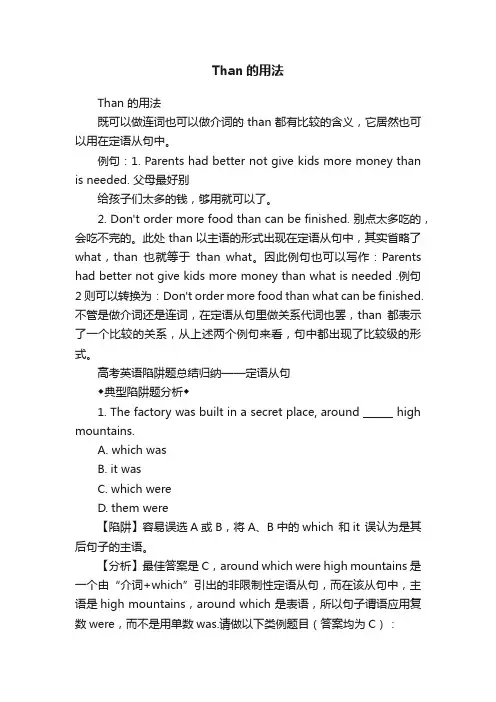
Than的用法Than 的用法既可以做连词也可以做介词的than都有比较的含义,它居然也可以用在定语从句中。
例句:1. Parents had better not give kids more money than is needed. 父母最好别给孩子们太多的钱,够用就可以了。
2. Don't order more food than can be finished. 别点太多吃的,会吃不完的。
此处than以主语的形式出现在定语从句中,其实省略了what,than也就等于than what。
因此例句也可以写作:Parents had better not give kids more money than what is needed .例句2则可以转换为:Don't order more food than what can be finished. 不管是做介词还是连词,在定语从句里做关系代词也罢,than都表示了一个比较的关系,从上述两个例句来看,句中都出现了比较级的形式。
高考英语陷阱题总结归纳——定语从句◆典型陷阱题分析◆1. The factory was built in a secret place, around ______ high mountains.A. which wasB. it wasC. which wereD. them were【陷阱】容易误选A或B,将A、B中的which 和it 误认为是其后句子的主语。
【分析】最佳答案是C,around which were high mountains 是一个由“介词+which”引出的非限制性定语从句,而在该从句中,主语是high mountains,around which 是表语,所以句子谓语应用复数were,而不是用单数was.请做以下类例题目(答案均为C):(1)Yesterday we visited a modern hospital, around _______ some fruit shops.A. which isB. it isC. which areD. them are(2)The murder happened in an old building, beside ______ the city police station.A. which areB. it isC. which isD. them are(3)Next month we’ll move to a new building, next to _______ a nice restaurants where we can have Chinese food.A. which areB. it isC. which isD. them are2. A man with a bleeding hand hurried in and asked, “Is there a hospital around ______ I can get some medicine for my wounded hand?”A. thatB. whichC. whereD. what【陷阱】容易误选B,认为around 是介词,选which 用以代替前面的名词hospital,在此用作介词around 的宾语。
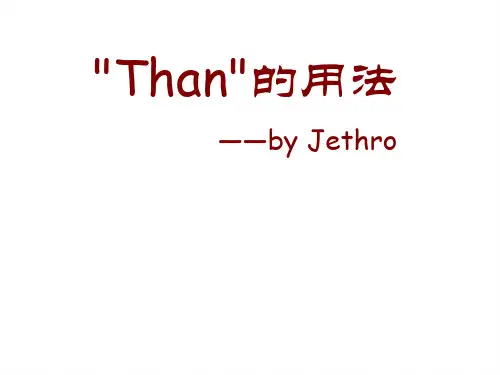
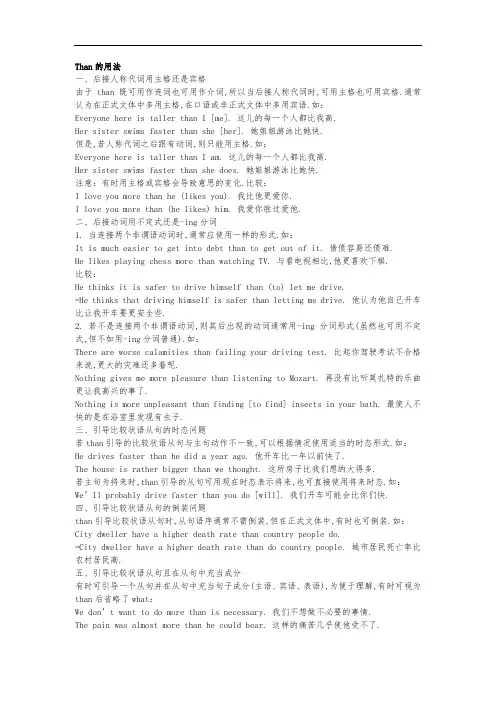
Than的用法一、后接人称代词用主格还是宾格由于than既可用作连词也可用作介词,所以当后接人称代词时,可用主格也可用宾格.通常认为在正式文体中多用主格,在口语或非正式文体中多用宾语.如:Everyone here is taller than I [me]. 这儿的每一个人都比我高.Her sister swims faster than she [her]. 她姐姐游泳比她快.但是,若人称代词之后跟有动词,则只能用主格.如:Everyone here is taller than I am. 这儿的每一个人都比我高.Her sister swims faster than she does. 她姐姐游泳比她快.注意:有时用主格或宾格会导致意思的变化.比较:I love you more than he (likes you). 我比他更爱你.I love you more than (he likes) him. 我爱你胜过爱他.二、后接动词用不定式还是-ing分词1. 当连接两个非谓语动词时,通常应使用一样的形式.如:It is much easier to get into debt than to get out of it. 借债容易还债难.He likes playing chess more than watching TV. 与看电视相比,他更喜欢下棋.比较:He thinks it is safer to drive himself than (to) let me drive.=He thinks that driving himself is safer than letting me drive. 他认为他自己开车比让我开车要更安全些.2. 若不是连接两个非谓语动词,则其后出现的动词通常用-ing分词形式(虽然也可用不定式,但不如用-ing分词普通).如:There are worse calamities than failing your driving test. 比起你驾驶考试不合格来说,更大的灾难还多着呢.Nothing gives me more pleasure than listening to Mozart. 再没有比听莫扎特的乐曲更让我高兴的事了.Nothing is more unpleasant than finding [to find] insects in your bath. 最使人不快的是在浴室里发现有虫子.三、引导比较状语从句的时态问题若than引导的比较状语从句与主句动作不一致,可以根据情况使用适当的时态形式.如:He drives faster than he did a year ago. 他开车比一年以前快了.The house is rather bigger than we thought. 这所房子比我们想的大得多.若主句为将来时,than引导的从句可用现在时态表示将来,也可直接使用将来时态.如:We’ll probably drive faster than you do [will]. 我们开车可能会比你们快.四、引导比较状语从句的倒装问题than引导比较状语从句时,从句语序通常不需倒装,但在正式文体中,有时也可倒装.如:City dweller have a higher death rate than country people do.=City dweller have a higher death rate than do country people. 城市居民死亡率比农村居民高.五、引导比较状语从句且在从句中充当成分有时可引导一个从句并在从句中充当句子成分(主语、宾语、表语),为便于理解,有时可视为than后省略了what:We don’t want to do more than is necessary. 我们不想做不必要的事情.The pain was almost more than he could bear. 这样的痛苦几乎使他受不了.She’s not a very good manager she always spends more money than she earns. 她不大会理财——总是入不敷出.Life here is much easier than it used to be. 如今在此地生活比起从前可舒服多了. 比较下面一句,than后的expected为省略结构:He returned three days earlier than (he was) expected. 他回来得比预料的要早三天.六、后接时间或条件状语从句若语义需要,有时其后可接when引导的时间状语从句以及if 引导的条件状语从句.如:You are a little fatter than when I saw you last. 你比我上次见你时胖点了.Joe carries only nine pounds more than when he was twenty. 乔比他20岁时只重了九磅.They work better together than if they are alone. 他们一起干比他们单干效果要好.七、同质比较还是异质比较than 通常用于两个不同的人或物在同一方面进行比较,但有时指的可能是同一个人或物在两个不同的方面进行比较,此时只用于more…than…结构,而不能用–er…than…的形式(即使是单音节也是如此),这类结构通常可译为“与其……不如……”“有……无……”.如:He’s more fat than short. 与其说他矮不如说他胖.They are more brave than wise. 他们有勇无谋.If we tell him about it, it may do more harm than good. 倘若我们把情况告诉他,那可能弊多利少.八、与never (a) 连用时如何理解有时than与带有never (a) 的比较级结构连用,表示强调,通常表示最高级的含义.如:I’ve never had a worse morning than today. 我哪一天早上也不像今天早上这样倒霉. 若意思明确,有时可省略than结构.如:He is fine, never better. 他很好,比以往任何时候都好.I’ve never seen a finer bird. 我从未见过比这更美的鸟.I’ve never found a better job. 这是我找到的最好的工作.九、than any other后接名词用单数还是复数than any other后接名词时通常用单数形式,很少用复数.如:He swims faster than any other student in his class. 他比班上的其他任何学生都游得快.More heat is lost through the head than any other part of the body. 从头部散发的热量比身体的其他任何部位都多.十、几组容易理解出错的than习语1.“no +比较级+than”与“not +比较级+than”(1) “no +比较级+than”用于否定两者,表示“与……一样不”,其义大致相当于其中形容词或副词的反义词用于as…as…结构.如:He is no richer than a beggar.=He is as poor as a beggar. 他穷如乞丐.This one is no better than that one.=This one is as bad as that one. 这个与那个一样不好.(2) “not +比较级+than”的意思是“不比……更”“不如”.如:He is not richer than you. 他不如你富有.This one is not better than that one. 这个不如那个好。

than的用法总结大全想了解than的用法么?今天给大家带来了than的用法,希望能够帮助到大家,下面就和大家分享,来欣赏一下吧。
than的用法总结大全than的意思conj. 比(用于比较级),宁愿…而不愿,除…以外,一…就prep. 超过,比than用法than可以用作连词than用作连词的意思是“比”,可指两个不同的人或物在同一方面进行比较,也可指同一个人或物在两个不同方面进行比较。
than用作连词时接名词或代词的主格形式是较正式的用法,若人称代词之后跟有动词, than后的人称代词只能用主格。
若than所连接的两个待比较的句子有相同成分,后者通常省略,若所连接的两个待比较的没有相同成分则不能省略。
than用作连词的用法例句She was older than I was.她年纪比我大。
I was inspired to work harder than ever before.我受激励比以往任何时候都更加努力地工作。
This street is four times shorter than that one.这条街道比那条短四倍。
than可以用作介词than用作介词时意思为“与…相比”,用于名词或代词前表示比较关系,也可用于在度量衡方面的比较。
than用作介词时其后接名词或代词的宾格形式是非正式用法,若人称代词之后有all, both则通常用宾格。
than用作介词的用法例句This street is four times shorter than that one.这条街道比那条短四倍。
John is more diligent than anyone else in his class.约翰比班上其他的同学用功。
than用法例句1、Their replies were no more than grunts of acknowledgement.他们所谓的回答不过是表示承认的咕哝罢了。
陈才英语教育及辅导中心日期:2018年1月5日比较级:使用than的常见语法难点一、后接人称代词用主格还是宾格由于than既可用作连词也可用作介词,所以当后接人称代词时,可用主格也可用宾格。
通常认为在正式文体中多用主格,在口语或非正式文体中多用宾语。
如:Everyone here is taller than I [me].这儿的每一个人都比我高。
Her sister swims faster than she [her].她姐姐游泳比她快。
但是,若人称代词之后跟有动词,则只能用主格。
如:Everyone here is taller than I am.这儿的每一个人都比我高。
Her sister swims faster than she does.她姐姐游泳比她快。
注意:有时用主格或宾格会导致意思的变化。
比较:I love you more than he (likes you).我比他更爱你。
I love you more than (he likes) him.我爱你胜过爱他。
二、后接动词用不定式还是动名词1. 当连接两个非谓语动词时,通常应使用一样的形式。
如:It is much easier to get into debt than to get out of it.借债容易还债难。
He likes playing chess more than watching TV.与看电视相比,他更喜欢下棋。
比较:He thinks it is safer to drive himself than (to) let me drive.=He thinks that driving himself is safer than letting me drive. 他认为他自己开车比让我开车要更安全些。
2. 若不是连接两个非谓语动词,则其后出现的动词通常用动名词形式(虽然也可用不定式,但不如用动名词普通)。
比较连词than的用法嘿,同学们,今天咱们就来好好讲讲比较连词 than 的用法。
than 这个词啊,主要是用于比较两个事物或人。
比如说,“He is taller than me.”(他比我高。
)在这个句子里,than 就把“他”和“我”进行了比较,突出了他更高的这个特点。
它可以用于不同的时态和句式中。
像一般现在时,“I run faster than my sister.”(我跑得比我妹妹快。
)一般过去时也可以,“She danced better than him yesterday.”(她昨天跳舞比他好。
)咱们再来看一些例子,帮助大家理解。
“This book is more interesting than that one.”(这本书比那本有趣。
)这里通过 than 比较了两本书的趣味性。
还有,“Our team scored more points than theirs.”(我们队比他们队得分多。
)这就是在比较两个队伍的得分情况。
在使用 than 的时候,要注意前后比较的内容在逻辑和形式上要相对应。
比如说,不能前面比较的是动作,后面突然变成比较名词了。
另外,有时候 than 后面还会跟着一些其他的词来进一步表达意思。
比如说,“He is much taller than me.”(他比我高得多。
)这里的 much 就加强了比较的程度。
再举个例子吧,“She is a little more beautiful than her sister.”(她比她妹妹稍微漂亮一点。
)这里的 a little 也起到了类似的作用。
还有一点很重要哦,如果 than 后面接的是人称代词,一般要用宾格形式。
就像刚才说的“He is taller than me.”而不是“He is taller than I.”。
同学们,一定要好好理解和掌握 than 的用法,这样在表达比较的时候就能更加准确和地道啦。
than作连词引导比较分句的用法"than"作为连词可以引导比较分句,用于比较两个或多个事物之间的差异或相似之处。
在比较分句中,一般采用以下结构:1. A + verb + comparative adjective + than + B.(A动词+ 比较级+ than + B)例句:- She runs faster than her brother.(她跑得比她兄弟快。
)- This book is more interesting than that one.(这本书比那本书更有趣。
)2. A + verb + more/less + adjective + than + B.(A动词+ more/less + 形容词+ than + B)例句:- He eats more slowly than his friends.(他吃得比他的朋友们慢。
)- She is less patient than her sister.(她比她姐姐不耐烦。
)3. A + verb + as + adjective/adverb + as + B.(A动词+ 和...一样+ 形容词/副词+ as + B)例句:- He runs as fast as his friends.(他和他的朋友们一样快跑。
)- She sings as beautifully as her mother.(她唱得和她妈妈一样美。
)注意:- "than"通常用于比较级,不用于最高级。
- 比较分句中的两个事物必须具有可比性,即属于同一类别或对等的事物。
- 在比较分句中,可以使用不同形式的词类(形容词、副词、名词等)进行比较。
than用法汇总英语连词than是一个使用频率很高的词,既可连接名词、代词、形容词、副词,又可以连接动词;既可用来强化肯定,又可加强否定语气。
下面就than的语法功能,举些例子说明。
一、than用于比较A>B1. Your father is older than mine.2. Easier said than done.说来容易做来难。
(谚语)(这一表达法是It is easier said than done的省略形式.)3. You love her more than I / me.注意:than I 是主语对比:你比我更爱她。
than me是主句之宾语与比较状语从句之宾语:你爱她胜过你爱我。
A<B4. This kind of computer is less expensive than that one.这种电脑没有那种贵。
5. I like this novel than I can say.我喜欢这本小说不能用语言说出来。
A=B(相当于as... as...)6. The food in this restaurant is no better than that in any other restaurant I have been to.这家餐馆的食品和我去过的任何一家餐馆差不多。
(注意no better不是not better)7. You speak English no worse than he.你的英语说得跟他差不多一样好。
(as well as)二、than用来加强语势8. Rather than ride on a crowded bus, he always prefers to ride a bicycle. (NMET94)他就是不去挤乘公交车而宁愿骑自行车。
9. Yang Liwei is more than a PLA(People’s Liberation Army) man; he is a pioneer in China’s space expedition.杨利伟不只是解放军战士,他还是远征太空的先锋。
than的用法和短语例句than有比;除…外等意思,那么你知道than的用法吗?下面跟着店铺一起来学习一下,希望对大家的学习有所帮助!than的用法大全:than的用法1:than用作连词的意思是“比”,可指两个不同的人或物在同一方面进行比较,也可指同一个人或物在两个不同方面进行比较。
than的用法2:than用作连词时接名词或代词的主格形式是较正式的用法,若人称代词之后跟有动词, than后的人称代词只能用主格。
than的用法3:若than所连接的两个待比较的句子有相同成分,后者通常省略,若所连接的两个待比较的没有相同成分则不能省略。
than的用法4:than若是连接两个非谓语动词,通常应保持一样的形式,若不是连接两个非谓语动词则其后通常用动名词。
than的用法5:than也可以用于两项事物比较时,引导的是被摒弃的那一项。
than的用法6:than用作介词时意思为“与…相比”,用于名词或代词前表示比较关系,也可用于在度量衡方面的比较。
than的用法7:than用作介词时其后接名词或代词的宾格形式是非正式用法,若人称代词之后有all, both则通常用宾格。
than的常用短语:用作连词 (conj.)barely〔hardly〕...than...一…,就…as soon asWe barely arrived than it was time to leave. 我们刚到就要离开了。
用作介词 (prep.)no other thanthan的用法例句:1. Their replies were no more than grunts ofacknowledgement.他们所谓的回答不过是表示承认的咕哝罢了。
2. She's got a great voice and is singing better than ever.她的嗓音非常好,现在的唱功比以往任何时候都要好。
3. The plane has been kept in service far longer than originally intended.这架飞机已经超期服役很长时间了。